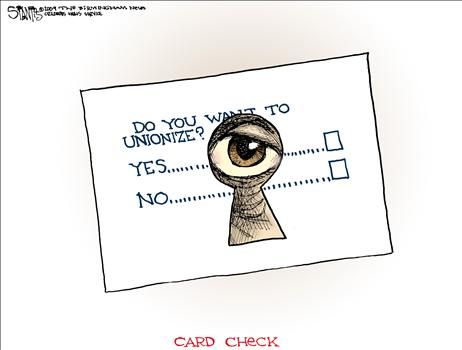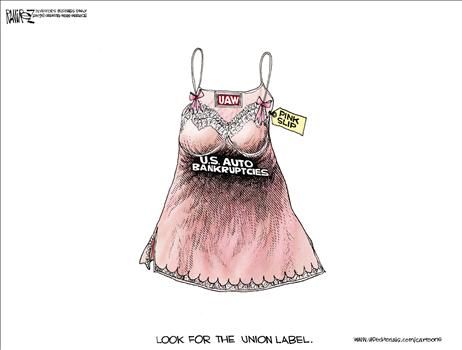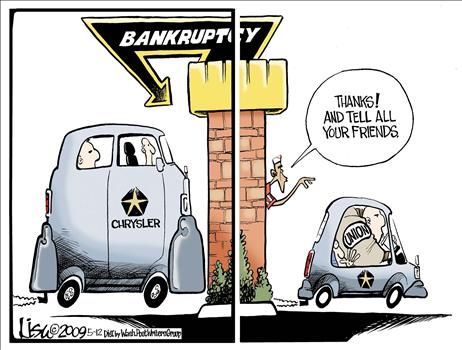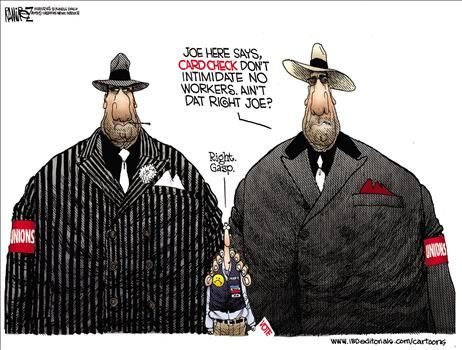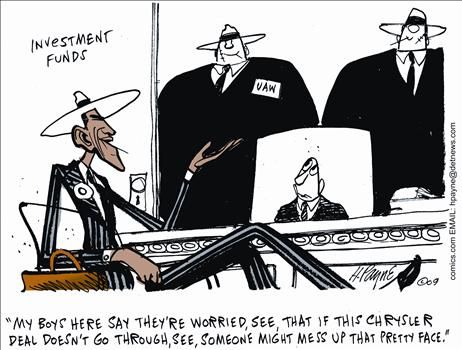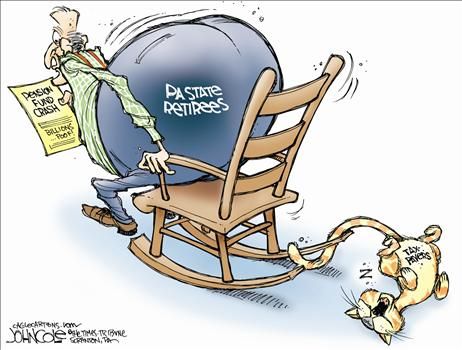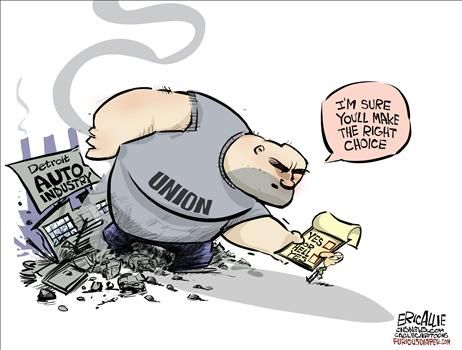Monday, September 7, 2009
Obama's Labor Day message
.
Just in time for Labor Day, President Barack Obama's (D) promises a "Labor Day and Fair Rewards for Hard Work:"
With Labor Day approaching, the President commits to rebuilding the economy so that a lifetime of hard work leads to a comfortable retirement, and explains his proposal to help to get there.
Meanwhile unemployment continues to climb--oh right, that's the fault of former President George W. Bush (R)--and stimulus, shovel ready projects aren't being shoveled. Meanwhile, cash dependent auto dealers are still waiting for their government cash for taking clunkers.
They are staring once again at empty showrooms, firing sales personnel but staying up at night filling out the 25 page intricately worded government forms for their clunker government rebate and new clunker free car owners listen incredulously as their accountants tell them, oh by the way, your clunker discount is taxable.
And oh yes, as far as fair rewards for hard work--the government will probably not renew the tax deductions set to expire in just a few months beginning in 2010 so your "lifetime of hard work" is seized by the government leading to a comfortable retirement for government bureaucrats paid for by your higher taxes.
So enjoy Labor Day. It is your fair reward for hard work.
READ MORE
UAW Has Reason to Celebrate This Labor Day
.
The Labor Day holiday is almost upon us and the networks are likely to spend it talking about vacation, barbequing and holiday sales instead of examining the 2009 victories of the labor unions. In fact, all year they avoided talking about the many recent blessings organized labor has enjoyed.
The United Auto Workers (UAW), which donated more than 99 percent of its $25.4 million to Democratic federal candidates, had a particularly good year, at least compared to other stakeholders as General Motors and Chrysler struggled and were forced into a 'government-managed' bankruptcy by the White House.
Those auto company bailouts and bankruptcies were major stories this year, yet the network news media rarely discussed union causes of the car companies' inability to compete, and the high cost of union labor compared to non-union labor. In fact, in some cases the UAW was portrayed to evoke sympathy from viewers.
NBC's Lester Holt said that the UAW had "made major concessions," on May 29 which would save GM $1.3 billion a year. CBS described it as "swallowing a bitter pill."
What were those "major concessions?" Hans Bader at the Competitive Enterprise Institute cited the Washington Post, which described them as "‘bitter' only by the peculiar standards of Big Three labor," as when all was said and done, the UAW's health fund ended up with 17.5 percent of GM shares and 55 percent of Chrysler shares...
READ MORE
Obama's curiously close labor friendship
.
- he visits weekly and says “We get heard.”
They led the most powerful forces in healthcare -- the trade groups representing doctors, insurance companies, hospitals and drug makers. Any one of them could stall, if not derail, President Obama's hopes of overhauling the U.S. healthcare system.
Instead, they stood with Obama before TV cameras at the White House and pledged their cooperation. For Obama, the show of unity gave momentum to perhaps his most ambitious domestic goal.
But the moment was a victory, as well, for another man invited to the event that morning in May - Andy Stern, who heads the SEIU. The SEIU spent $60 million to help elect Obama. Stern said the group deployed 100,000 volunteers during the campaign, including 3,000 who worked on the election full time.
With nearly 2 million members, the SEIU says it has people in 13 states whose senators are considered important targets in the lobbying effort behind the emerging Democratic healthcare bill.
The union wants to 'coax' those senators into voting for the bill...
READ MORE
Labor Department seeks to cancel rule on unions
.
WASHINGTON - The Labor Department moved Tuesday to rescind a regulation approved during President George W. Bush's last days in office that would have increased scrutiny of union finances to help root out financial corruption.
The agency said it considered the comments of numerous labor organizations in making its decision...
READ MORE
Labor unions pressure Wall Street on ending secret ballots for unionization
.
Ben Smith of Politico documents far-from-subtle attempts of Big Labor to intimidate Wall Street money managers into dropping their opposition to the Orwellian-named Employee Free Choice Act, that would end secret ballots in unionization elections.
The labor movement is taking square aim at Wall Street with a new tool in its fight to pass the Employee Free Choice Act: the hundreds of billions of dollars in pension funds it manages for union workers and retirees, some of it held by the same firms that are fighting the provision known as "card check."
"Has your company made any public statements in support or opposition to EFCA?" asks one of nine pointed questions in a polite, detailed four-page questionnaire.
"If 'Yes,' please explain."
To paraphrase:
Be a shame if anything happened to it."
Pension funds are accompanied by a fiduciary duty. Their custodians must invest them in the financial best interests of the owners, the pension holders.
Of course, if you presume that the federal government will bail out any shortfall, then it makes sense to use them for political blackmail.
READ MORE
PUBLIC TIRING OF LABOR UNIONS - ESPECIALLY IN THEIR GOVERNMENT
.
The approval rating of one of the biggest supporters of Obama's attempt to impose a socialist system on America has plummeted. Gallup has been polling on the public's attitude to Labor Unions since the 1930s. They report public support of unions is at an all time low.
More broadly, fewer than half of Americans -- 48%, an all-time low -- approve of labor unions, down from 59% a year ago.
This is seven percentage points below the former low of 55%, reached in both 1979 and 1981. Throughout the 1970s there had been both labor strife and growing reports of union corruption, culminating in the 1979 murder of United Mineworker dissident Joseph ("Jock") Yablonski. The 1981 low related to the illegal strike by federal air traffic controllers that resulted in Ronald Reagan dismissing all 13,000 controllers. Public support for Reagan's action muzzled labor union activism for many years.
With the administration relying on organized labor to come out strong for his agenda, these are grim numbers.
One suspects the current tumble in public approval of unions reflects both the highly unpopular government takeover of the highly unionized General Motors and and the intransigence of many public employee unions about wages and particularly benefits as states, counties and municipalities attempt to balance their budgets...
READ MORE
Card Check: Good for Unions, Bad for America
.
The Obama administration's budget is full of proposals that threaten to weaken our staggering economy. Higher taxes on high earners and reduced deductions for their charitable contributions and mortgage interests. A cap-and-trade system that will impose higher costs on everyone who uses electricity. A national health insurance program that will take $600 billion or so out of the private-sector economy.
ut the most grievous threat to future prosperity may be off-budget -- the inaptly named Employee Free Choice Act. Also known as card check, the legislation would effectively abolish secret ballots in unionization elections. It provides that once a majority of employees had filled out sign-up cards circulated by union organizers, the employer would have to recognize and bargain with the union. And if the two sides didn't reach agreement in a short term, federal arbitrators would impose one. Wages, fringe benefits and work rules would all be imposed by the federal government.
It's not difficult to see why union leaders want this. Union membership has fallen from more than 30 percent of the private-sector workforce in the 1950s to about 8 percent today. Union leaders would like to see that go up. So would most Democratic politicians, since some portion of union dues -- unions try to conceal how much -- goes directly or indirectly to support Democratic candidates. The unions and the Democrats want to put up a tollgate on as much of the private sector as they can, to extract money from consumers of goods and services.
They have already set up such tollgates on much of the public sector. In the 1950s, very few public-sector workers were union members. Today, nearly half of all union members are public-sector employees. In many states and central cities -- think California and New York City -- public-sector unions channel vast flows of money, all of it originating from taxpayers, to themselves and to Democratic politicians. The unions use that money to promote some public policies that are not obviously in the interests of public-sector employees -- restrictive trade regulations, for example, which appeal to nostalgic union leaders who would like to see millions of unionized autoworkers and steelworkers once again.
In the previous Congress, the unions got the Democratic House to pass the card check proposal and got every Democratic senator not only to vote for it but to co-sponsor it, as well. But the votes of all Democrats plus that of Pennsylvania Republican Arlen Specter were not enough then to overcome a Senate filibuster. This year, there is little doubt that Speaker Nancy Pelosi could again jam card check through the House. But moderate Democrats from districts where unions are unpopular have gotten her to spare them a vote until and unless the measure gets through the Senate.
There, its prospects are not so good, now that there is no longer a Republican president to veto it. Card check supporters have a list of 15 Democratic senators who have expressed some manner of unease about the issue. Does Arkansas Sen. Blanche Lincoln, up for re-election in 2010, really want to pass a law strongly opposed by her state's biggest business, Wal-Mart, long a target of union organizers? Do Democratic senators from right-to-work states where employees can't be required to join unions want to go along?
As for Specter, union leaders have publicly said they'll support him if he backs card check. His public response has been to hail the importance of the secret ballot and the undesirability of mandatory arbitration.
Politicians can read numbers. Pollster Scott Rasmussen reported last week that 61 percent of Americans think it's fair to require a secret ballot vote if workers want a union. Only 18 percent disagree. Congressional Democrats used to believe that themselves -- in the course of a trade debate in 2001, they urged that Mexico hold secret ballot unionization elections.
Rasmussen also reported an interesting difference between current union members and non-members. Union members by a 47 percent to 18 percent margin thought most workers want to join a labor union. But non-members believe by a 56 percent to 14 percent margin that most workers don't.
Are non-union members deluded? Why don't they want the supposedly higher wages and job protections unions purport to give them? Maybe it's because the adversarial unionism promoted by the Wagner Act of 1935 is out of date. It made some sense when employers used time-and-motion study to speed up assembly lines and squeeze the last quantum of energy out of workers and could lay off workers at will.
But today's employees have unemployment compensation and are protected by various anti-discrimination laws. There is a whole raft of employment law that didn't exist in 1935, and corporate human resources departments are disciplined by that law.
As the Detroit automakers' troubles show, the adversarial work rules insisted on by the United Auto Workers -- a relatively enlightened union in this area -- made them unable to compete in quality or cost with foreign automakers who employ cooperative management techniques and treat their workers as intelligent partners rather than as dumb animals, the way the time-and-motion study managers did in the 1930s.
Card check would give coercive union organizers the chance to impose on large swaths of the private-sector economy the burdens the UAW imposed on the Detroit automakers. It would set up tollgates to channel the money of consumers as well as taxpayers to the Democratic Party. You can see how that would be good for union leaders and Democrats.
But good for America?
READ MORE










